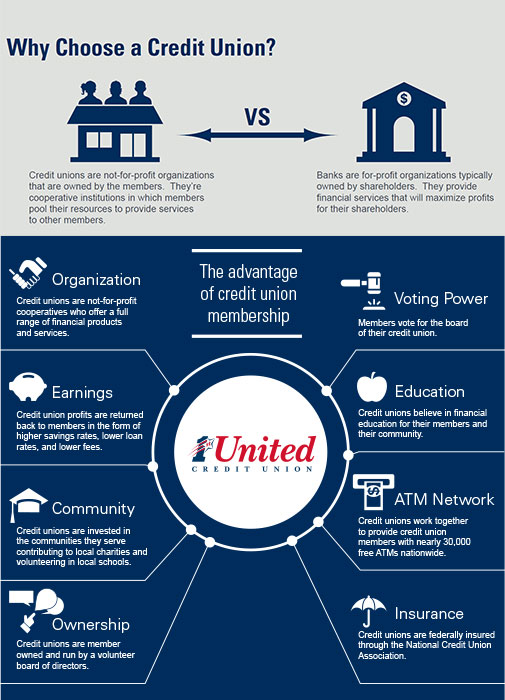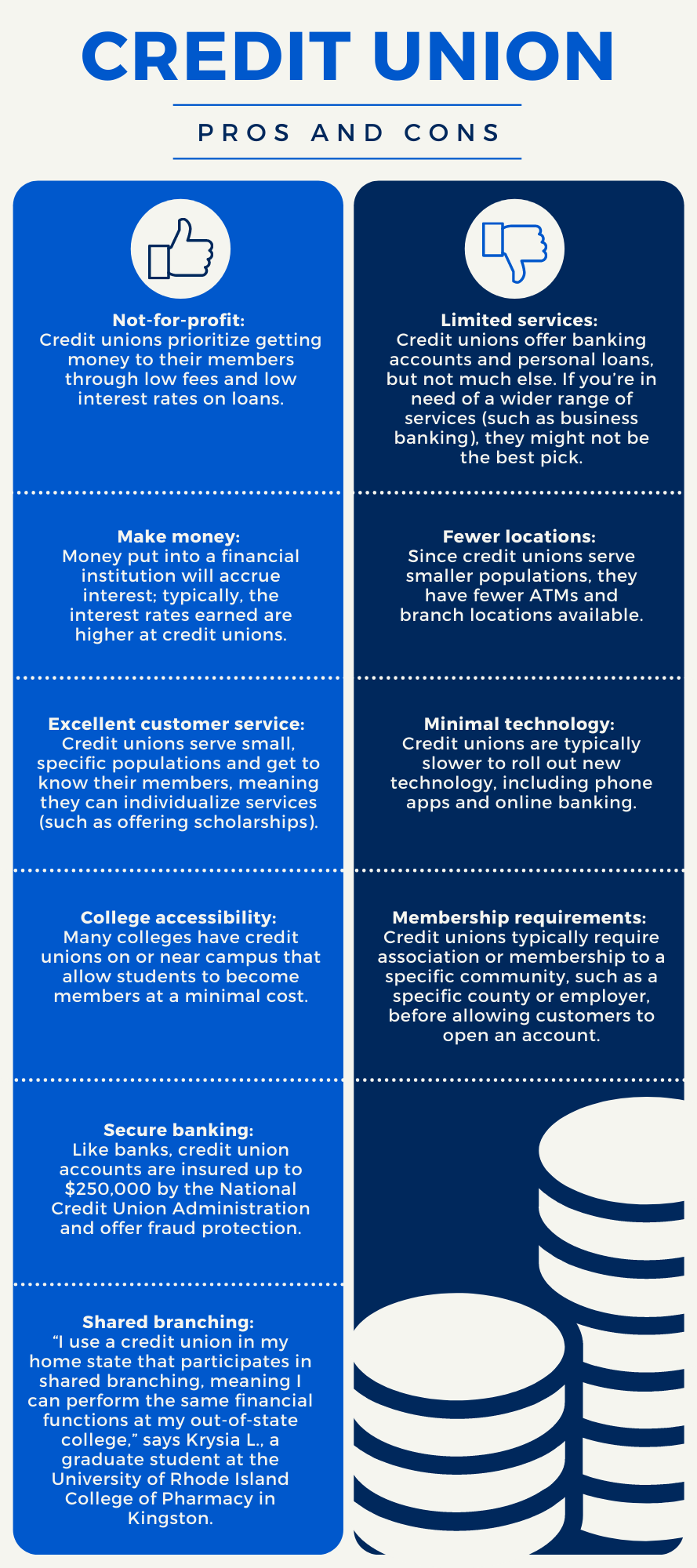Federal Credit Union: Dependable and Safe Financial in Wyoming
Federal Credit Union: Dependable and Safe Financial in Wyoming
Blog Article
The Ultimate Overview to Comprehending Lending Institution
Lending institution stand as one-of-a-kind financial entities, rooted in concepts of mutual assistance and member-driven operations. Beyond their fundamental worths, understanding the detailed workings of debt unions includes a much deeper expedition. Deciphering the intricacies of subscription eligibility, the advancement of solutions provided, and the unique benefits they bring calls for a comprehensive assessment. As we browse via the intricacies of credit score unions, an informative journey awaits to drop light on these member-focused organizations and just how they vary from typical banks.
What Are Credit Report Unions?
Debt unions are member-owned banks that supply a variety of financial services to their members. Unlike traditional financial institutions, cooperative credit union run as not-for-profit companies, indicating their main focus gets on offering their participants rather than taking full advantage of revenues. Members of a credit history union normally share a typical bond, such as benefiting the same company, belonging to the same area, or becoming part of the same company.
One of the key advantages of cooperative credit union is that they typically use higher interest prices on interest-bearing accounts and reduced rate of interest on lendings compared to banks. This is since cooperative credit union are structured to benefit their participants directly, permitting them to pass on their revenues in the type of far better rates and less charges. In addition, credit report unions are known for their individualized client service, as they focus on developing partnerships with their members to comprehend their distinct monetary demands and goals.
Background and Advancement of Cooperative Credit Union

The origins of member-owned monetary cooperatives, known today as cooperative credit union, trace back to a time when communities sought choices to typical financial organizations. The concept of lending institution originated in the 19th century in Europe, with Friedrich Wilhelm Raiffeisen often attributed as the pioneer of the cooperative financial motion (Cheyenne Credit Unions). Raiffeisen established the first identified credit score union in Germany in the mid-1800s, highlighting community assistance and self-help principles
The advancement of cooperative credit union continued in The United States and copyright, where Alphonse Desjardins established the initial credit report union in copyright in 1900. Shortly after, in 1909, the initial U.S. lending institution was developed in New Hampshire by a team of Franco-American immigrants. These early credit rating unions operated the fundamental concepts of common support, autonomous control, and member possession.
Over time, credit score unions have expanded in appeal worldwide because of their not-for-profit framework, focus on serving participants, and offering affordable economic product or services. Today, credit scores unions play an essential role in the monetary sector, offering community-oriented and accessible banking choices for organizations and people alike.
Membership and Qualification Criteria
Subscription at a cooperative credit union is usually limited to people fulfilling specific eligibility criteria based on the organization's starting principles and regulative demands. These criteria frequently include elements such as geographic place, employment condition, membership in specific organizations, or affiliation with particular teams (Cheyenne Federal Credit Union). Lending institution are known for their community-oriented approach, which is mirrored in their subscription demands. For instance, some cooperative credit union might only serve individuals that work or live in a particular area, while others might be customized to workers of a certain company or members of a certain organization.
Additionally, cooperative credit union are structured as not-for-profit organizations, meaning that their main goal is to offer their members instead of create revenues for investors. This focus on participant service typically converts into even more personalized interest, reduced costs, and competitive rate of interest on financial savings and lendings accounts. By satisfying the qualification criteria and ending up being a participant of a credit report union, people can access a variety of monetary services and products customized to their specific needs.
Solutions and Products Supplied
Among the crucial facets that establishes credit unions apart is the diverse variety of financial product and services they supply to their participants. Cooperative credit union typically provide traditional financial solutions such as financial savings and examining accounts, fundings, and charge card. Participants can likewise gain from investment solutions, consisting of retirement accounts and financial preparation help. Lots of cooperative credit union provide competitive rate of interest on cost savings accounts and lendings, as well as reduced fees contrasted to standard banks.
Furthermore, cooperative credit union commonly offer hassle-free online and mobile banking choices for members to quickly handle their finances. They might supply benefits such as common branching, allowing members to access their accounts at various other cooperative credit union throughout the country. Some cooperative credit union additionally offer insurance policy products like home, life, and auto insurance policy to assist participants shield their possessions and loved ones.
In enhancement to financial services, Credit Union in Wyoming cooperative credit union frequently engage in area outreach programs and financial education efforts to support their participants in accomplishing their economic objectives.
Benefits of Financial With Credit Unions
When thinking about economic establishments, exploring the advantages of banking with credit unions exposes distinct benefits for members seeking customized service and competitive rates. One substantial benefit of credit rating unions is their concentrate on personalized customer care. Unlike huge financial institutions, cooperative credit union are member-owned and focus on structure strong connections with their members. This means that credit rating union staff often have a much deeper understanding of their participants' monetary demands and can supply tailored services to help them attain their objectives. Additionally, credit history unions are known for offering affordable rates of interest on cost savings and car loans accounts. Because they are not-for-profit companies, cooperative credit union can typically provide reduced funding rates, greater savings prices, and lower costs compared to typical banks. This can cause substantial cost financial savings for members with time. In general, financial with a credit union can supply a more individualized, cost-effective, and member-centric monetary experience.
Final Thought

Credit unions are member-owned financial establishments that supply a range of banking services to their members. The idea of debt unions originated in the 19th century in Europe, with Friedrich Wilhelm Raiffeisen typically credited as the leader of the participating financial activity.The advancement of credit unions continued in North America, where Alphonse Desjardins established the first credit history union in copyright in 1900. Credit score unions typically provide traditional banking solutions such as financial savings and checking accounts, car loans, and credit report cards.When thinking about monetary organizations, checking out the advantages of banking with credit scores unions exposes distinct benefits for participants looking for individualized service and competitive prices.
Report this page